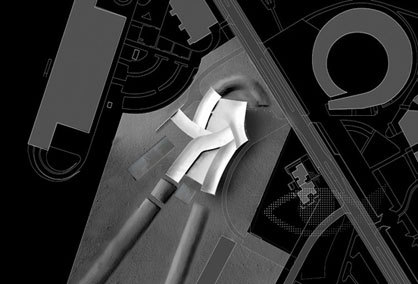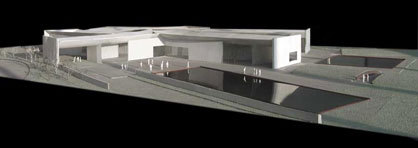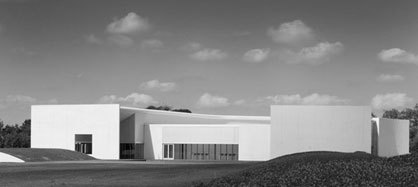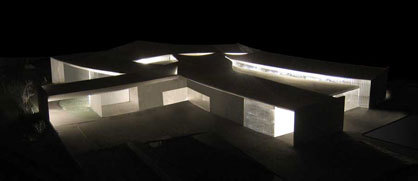Herning Museum of Contemporary Art
Texte par NoéMie Schwaller
Zürich, Suisse
15.07.09
Herning Museum of Contemporary Art will open to the public on September 9, 2009 uniting three distinct cultural institutions: the Herning Center of the Arts, the MidWest Ensemble and the Socle du Monde.
Herning Museum of Contemporary Art will open to the public on September 9, 2009 uniting three distinct cultural institutions: the Herning Center of the Arts, the MidWest Ensemble and the Socle du Monde.
Herning Museum of Contemporary Art, Denmark, designed by Steven Holl Architects
A fusion of landscape and architecture, the landscape of grass mounds and reflecting pools aligns with a geometry of curved roof sections in a new building that houses permanent and temporary exhibition galleries, a 150-seat auditorium, music rehearsal rooms, a restaurant, a media library, and administrative offices all on one level.
The new center is intended to be an innovative forum combining visual art and music, providing a driving cultural force for the region of central Jutland, Denmark.

The new center is intended to be an innovative forum combining visual art and music, providing a driving cultural force for the region of central Jutland, Denmark.
×Herning’s longstanding relationship with textiles and the textile industry, as well as the museum’s large collection of original works by Piero Manzoni (in total 46 works) forms the inspiration for the building’s design concept. The museum is sited near Herning’s original Angli shirt factory, and the shirt collar-shaped plan of its 1960s building has inspired the shape of the new museum building. Viewed from above, HEART’s roof geometry resembles a collection of shirt sleeves laid over the gallery spaces. The loose edges of the plan offer spaces for the café, auditorium, lobby, and offices. The exhibition spaces can be easily closed, while all peripheral spaces remain open for after-hours use.
Fabric tarps were inserted into the formwork to yield a fabric texture to the building’s exterior walls of white concrete.

Fabric tarps were inserted into the formwork to yield a fabric texture to the building’s exterior walls of white concrete.
×The galleries are orthogonal in plan and finely proportioned for art, while overhead curved roof sections transport natural light into the spaces.
The galleries’ perimeter walls are load bearing elements, emphasizing these as “treasure boxes” in the museum, while internal gallery walls of lightweight construction are movable. Floors of integral color charcoal concrete unify the ground plane into a continuous patina with a wax finish.
The surrounding landscape is partially shaped in the reverse-curve of the geometry of the museum’s roof. In transforming the flat field around the site, a new 40,000sf bermed landscape of grass mounds and pools conceals parking and service areas, while drawing the focus onto reflecting pools positioned in the south sun.
The Museum will open with a new installation of the works of Italian artist Jannis Kounellis and will display its large permanent collection of Arte Povera works.





